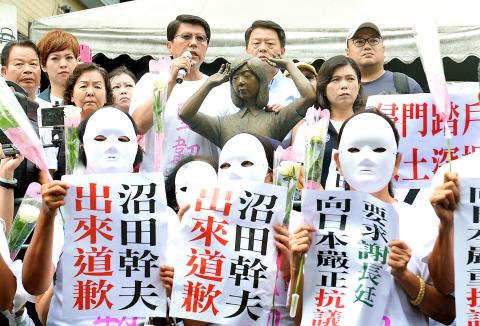The Chinese Nationalist Party (KMT), the Tainan Association for Comfort Women’s Rights and pro-unification groups yesterday protested outside the Japan-Taiwan Exchange Association in Taipei, requesting an apology over an “assault” on a statue of a “comfort woman” in Tainan by a Japanese nationalist last week.
The statue, which the KMT’s Tainan chapter and association erected last month, commemorates victims of sexual exploitation by the Imperial Japanese army during Word War II.
KMT Tainan City Councilor Hsieh Lung-chieh (謝龍介), who organized the protest, on Sunday posted a video on Facebook showing Mitsuhiko Fujii, who visited Taiwan reportedly representing 16 Japanese right-wing groups, allegedly kicking the statue.

Photo: Lin Cheng-kung, Taipei Times
About 90 people, including Hsieh, KMT legislators Alicia Wang (王育敏) and Arthur Chen (陳宜民), Taipei City councilor candidates Chung Pei-chun (鍾沛君), Hsu Chiao-hsin (徐巧芯) and Yu Shu-hui (游淑慧), and Tainan City councilors Tsai Shu-hui (蔡淑惠) and Hung Yu-feng (洪玉鳳), rallied outside the Japanese representative office in Taipei, calling for an apology from Japanese Representative to Taiwan Mikio Numata and demanding that Fujii be barred from leaving the nation until he apologizes in front of the statute.
They also called on Representative to Japan Frank Hsieh (謝長廷) to lodge a formal complaint with Japanese Prime Minister Shinzo Abe.
Protesters wore white T-shirts with the word “strength” and carried white roses.
“As women, and as members of a democracy, why would we not have the right to set up a statue for comfort women? The purpose of the statue is to educate people about history and not to cause hatred and conflict,” association president Huang Shu-chen (黃淑貞) said.
Japan should face up to its own history, she said, adding that she hopes the only two known comfort women surviving today would have a chance to receive a formal apology from Japan in their lifetime.
New Party spokesman Wang Ping-chung (王炳忠) also took part in the protest, but remained in a campaign truck throughout.
Some of the protesters threw eggs at the building, but most were prevented from doing so by a net that police had set up.
After about half an hour, a Japanese official came out to receive a letter of complaint from the KMT.
When asked to comment, the exchange association said that it had no comment on the issue.
At about 6pm, China Unification Promotion Party member Lee Cheng-lung (李承龍) and three other party members allegedly splashed paint on the front of the exchange association’s offices.
The four were detained by police for questioning.
The exchange association last month in a statement responded to the erection of the comfort woman statue, saying that all matters related to comfort women are handled through the Asian Women’s Fund.
The fund, established in 1994, offers compensation and medical support to former comfort women, along with a letter of apology from the Japanese government, it said.
The Japanese government understands that the reputation and dignity of former comfort women have been hurt, it said, adding that it has been handling the issue with sincerity and would continue to do so.
This story has been corrected since it was first published.

The brilliant blue waters, thick foliage and bucolic atmosphere on this seemingly idyllic archipelago deep in the Pacific Ocean belie the key role it now plays in a titanic geopolitical struggle. Palau is again on the front line as China, and the US and its allies prepare their forces in an intensifying contest for control over the Asia-Pacific region. The democratic nation of just 17,000 people hosts US-controlled airstrips and soon-to-be-completed radar installations that the US military describes as “critical” to monitoring vast swathes of water and airspace. It is also a key piece of the second island chain, a string of

A magnitude 5.9 earthquake that struck about 33km off the coast of Hualien City was the "main shock" in a series of quakes in the area, with aftershocks expected over the next three days, the Central Weather Administration (CWA) said yesterday. Prior to the magnitude 5.9 quake shaking most of Taiwan at 6:53pm yesterday, six other earthquakes stronger than a magnitude of 4, starting with a magnitude 5.5 quake at 6:09pm, occurred in the area. CWA Seismological Center Director Wu Chien-fu (吳健富) confirmed that the quakes were all part of the same series and that the magnitude 5.5 temblor was

Taiwan will now have four additional national holidays after the Legislative Yuan passed an amendment today, which also made Labor Day a national holiday for all sectors. The Chinese Nationalist Party (KMT) and Taiwan People’s Party (TPP) used their majority in the Legislative Yuan to pass the amendment to the Act on Implementing Memorial Days and State Holidays (紀念日及節日實施辦法), which the parties jointly proposed, in its third and final reading today. The legislature passed the bill to amend the act, which is currently enforced administratively, raising it to the legal level. The new legislation recognizes Confucius’ birthday on Sept. 28, the

The Central Weather Administration has issued a heat alert for southeastern Taiwan, warning of temperatures as high as 36°C today, while alerting some coastal areas of strong winds later in the day. Kaohsiung’s Neimen District (內門) and Pingtung County’s Neipu Township (內埔) are under an orange heat alert, which warns of temperatures as high as 36°C for three consecutive days, the CWA said, citing southwest winds. The heat would also extend to Tainan’s Nansi (楠西) and Yujing (玉井) districts, as well as Pingtung’s Gaoshu (高樹), Yanpu (鹽埔) and Majia (瑪家) townships, it said, forecasting highs of up to 36°C in those areas